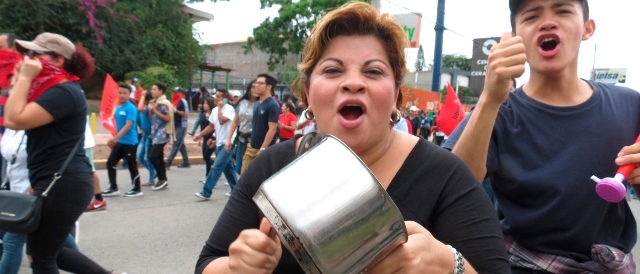
Honduras: a stolen election and the legacy of a coup d'état
On November 26, citizens of Honduras went to the polls to elect a new president. The election was stolen, triggering a new crisis in a country tormented by violence, corruption and judicial impunity.
Tentative progress towards democracy in Honduras after 1980, following decades of authoritarian government and military dictatorship, left the country still struggling with what is euphemistically termed a 'democratic deficit'. That halting progress was shredded in a 2009 coup d'état which launched the country on a nightmare spiral of repression, corruption and widening poverty. The traditional business elite, with its fondness for police power and repression, found new sources of enrichment in wholesale landgrabbing and expropriation.
Trade unionists, peasant and environmental activists, civil rights defenders and government critics have been murdered with impunity. The criminal code has been rewritten to classify protest as terrorist activity. The social security system has been pillaged to fund corruption and enrichment. President Hernandez stacked the Supreme Court to permit him to run in the election he has just stolen.
 Democratic forces resisted, and continue to resist. The IUF Latin American secretariat and affiliates in Honduras and in the region have given constant support to that resistance. Hondurans immediately took to the streets when the scope of the electoral fraud was revealed. They met with police violence, a curfew and a de facto state of emergency. They continue to resist, and the depth of that resistance is reflected in the December 5 statement of the heavily militarized national police in the capital Tegucigalpa that they would refuse to enforce the curfew. "We don't want to repress and violate the rights of the Honduran people", their spokesperson told the press.
Democratic forces resisted, and continue to resist. The IUF Latin American secretariat and affiliates in Honduras and in the region have given constant support to that resistance. Hondurans immediately took to the streets when the scope of the electoral fraud was revealed. They met with police violence, a curfew and a de facto state of emergency. They continue to resist, and the depth of that resistance is reflected in the December 5 statement of the heavily militarized national police in the capital Tegucigalpa that they would refuse to enforce the curfew. "We don't want to repress and violate the rights of the Honduran people", their spokesperson told the press.
The 2009 coup was quickly followed by the farcical election of a "de facto" government; the initial wave of sanctions and condemnations soon yielded to retractions, acquiescence and recognition. The scenario cannot be allowed to repeat itself.
The discredited electoral commission has offered a limited recount which can only result in another 'de facto' government. Every ballot must be recounted under the supervision of reliable, experienced and legitimate observers, with the full involvement of the political opposition and civil society. Maximum international pressure must be put on the incumbent government. That pressure must continue beyond the necessary recount to ensure that the toxic legacy of 2009 is repudiated and the people of Honduras have the means to challenge impunity, violence, corruption and institutionalized thievery.
 Facebook
Facebook Google+
Google+ Reddit
Reddit Twitter
Twitter






